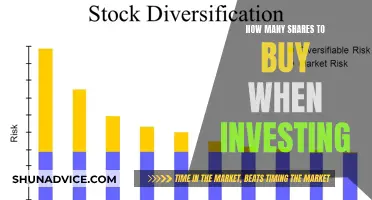
Paying off your mortgage early or investing your extra funds is a common dilemma for many homeowners. While being debt-free is an admirable goal, it might not always be the best financial decision.
If you have extra money, you could either pay off your mortgage early or invest it in an index fund that tracks the S&P 500 Index, for example. The S&P 500 has returned an average of 10-11% annually since 1926, so you could potentially earn more by investing than by paying off your mortgage early. However, there are several factors to consider when deciding how to allocate your extra funds.
Firstly, it's important to assess your risk tolerance. Paying off your mortgage is generally considered a safer option, as it's predictable and you know exactly how much you're saving. On the other hand, investing in the stock market comes with higher potential returns but also carries more risk.
Secondly, consider whether you're in the early or later years of your mortgage. In the early years, your payments mostly go towards interest on the loan, so making extra payments can reduce the total interest owed over the loan's life. In the later years, your payments go more towards the principal, so paying off your mortgage early may not reduce your interest burden as significantly.
Thirdly, evaluate your financial situation and whether you have enough liquid assets to cover unexpected expenses. Paying off your mortgage early may leave you with less cash on hand, so it's important to ensure you have sufficient savings and investments to cover any emergencies.
Finally, consider the opportunity cost of paying off your mortgage early. By investing your extra funds instead, you could potentially earn higher returns and build your future wealth. However, investing also carries the risk of losses, so it's important to carefully weigh your options before making a decision.
| Characteristics | Values |
|---|---|
| Interest savings | Save thousands or tens of thousands of dollars in interest payments |
| Peace of mind | No longer having constant debt |
| Build equity | Build equity in your home more quickly |
| Opportunity cost | Money spent on paying down the mortgage faster cannot be used for other financial goals |
| Liquidity | Property is an illiquid asset |
| Tax breaks | Loss of tax deductions for mortgage interest |
| Returns | Returns from investing are higher than savings from paying off the mortgage early |
| Risk | Investing in the stock market is riskier than paying off the mortgage |
| Debt | Investing does not reduce debt |
What You'll Learn

Weigh up the interest saved vs potential investment gains
When deciding whether to invest or pay off your mortgage, it's crucial to weigh the potential interest savings of early repayment against the prospective returns from investing those funds. This decision depends on various factors, including the borrower's financial situation, the loan's interest rate, and their proximity to retirement.
Let's consider an example where an individual has a remaining balance of $200,000 on their mortgage and receives a windfall of $120,000. Should they invest this money or use it to pay off their mortgage early?
If they choose to invest the $120,000 in a financial market with an average rate of return of 5% over ten years, they would earn approximately $62,889. On the other hand, if they use this money to pay off their mortgage early with an interest rate of 3.5%, they would save $20,270 in interest. In this case, investing yields a higher financial benefit.
However, it's important to remember that investments carry different risk levels. Choosing to invest instead of paying off a mortgage early comes with the risk of losing some or all of the invested money. The stock market can provide substantial returns but also carries the risk of significant losses.
On the other hand, paying off your mortgage early provides peace of mind, eliminates your monthly mortgage payments, and saves you money in interest. Additionally, it allows you to build equity in your home faster, which can be beneficial if you need to access funds through a home equity loan or line of credit.
When making this decision, it's recommended to consult a financial planner and tax advisor to effectively assess your personal circumstances and financial goals.
Microsoft: Invest Now or Miss Out?
You may want to see also

Assess your risk appetite
Once you've paid off your house, you might be wondering what to do with your money. Investing is a popular option, but it's important to remember that investing always comes with risk. Before you start investing, it's crucial to assess your risk appetite to ensure you're making the right choices for your financial goals and comfort level. Here's a detailed guide to help you understand and assess your risk appetite:
Understanding Risk Appetite
Risk appetite refers to the amount of risk an investor is willing to take on to achieve their financial objectives. It's shaped by factors such as age, income, investment expertise, and strategy. Younger investors with a longer time horizon are generally more willing to take on higher risks, as they have more time to recover from potential losses. On the other hand, older investors with a shorter investment timeframe tend to be more cautious. Your income level also plays a role, as those with higher disposable income can typically afford to take on greater risks.
Determining Your Risk Appetite
- How much money do I have to invest?
- How much money am I comfortable losing?
- How worried would I be if the markets fell dramatically?
- Will I be actively tracking my investments daily?
- What are my investment goals and timeframes?
- Am I investing for the short term or long term?
- What types of investments am I considering?
Types of Risk Appetite
Risk appetite can generally be categorized into three types: aggressive, moderate, and conservative. An aggressive risk appetite means an investor is willing to lose large amounts of money to achieve potentially huge gains. These investors are often looking for get-rich-quick opportunities or are highly knowledgeable about the market. A moderate risk appetite describes investors who are comfortable with risk but are cautious about losing too much money. They carefully weigh their options and only invest what they are willing to lose. Finally, a conservative or low-risk investor is the most cautious. They are satisfied with small profits and focus on building a portfolio with low-volatility instruments that provide gradual returns.
Balancing Risk and Reward
When investing, it's essential to find the right balance between risk and reward. Avoiding risk altogether may result in steady but small profits. In contrast, taking on high-risk investments can bring significant rewards but also carries a higher chance of losses. A well-diversified portfolio typically includes a mix of different asset classes, such as stocks, property, bonds, and cash, across various industries, markets, and countries. This diversification helps reduce the correlation between investments, ensuring that some assets perform well even when others are not.
Adjusting Your Risk Appetite Over Time
It's important to remember that your risk appetite may change over time as your financial situation, goals, and priorities evolve. Regularly reviewing and adjusting your investment portfolio to match your current risk appetite and overall investment objectives is crucial. Consulting a financial advisor can be beneficial, as they can provide guidance and help you make well-informed decisions about your investments.
Investing: A Guide for Every Age
You may want to see also

Consider the liquidity of your assets
Liquidity refers to how quickly and easily an asset can be converted into cash. When deciding whether to pay off your mortgage or invest, it's important to consider the liquidity of your assets.
Your home is considered a non-liquid asset because it can take months, or even longer, to sell the property and access the capital. This lack of liquidity can be a significant disadvantage if you need to free up cash quickly, for example, in the event of a financial emergency.
On the other hand, investing in stocks, bonds, and other marketable securities provides you with liquid assets that can be easily converted to cash if needed. This liquidity can offer peace of mind and financial flexibility.
When deciding whether to pay off your mortgage early or invest, it's crucial to assess your liquidity needs. Here are some factors to consider:
- Emergency fund and liquid assets: Ensure you have sufficient liquid assets, such as an emergency fund, stocks, mutual funds, or bonds, that can be easily converted to cash in case of unexpected expenses or financial difficulties.
- Diversification: Diversifying your investments across different asset classes can help maintain a balance between liquidity and long-term financial goals.
- Risk tolerance: Investing in the stock market or other volatile assets may offer higher liquidity but also carries higher risks. Carefully consider your risk tolerance and financial situation before making any decisions.
- Opportunity cost: Evaluate the opportunity cost of paying off your mortgage early versus investing in liquid assets. Consider the potential returns and risks associated with each option, keeping in mind that investing in liquid assets may provide higher financial flexibility but could also result in higher gains or losses.
- Peace of mind: While paying off your mortgage early can provide peace of mind and reduce stress, it's important to weigh this against the potential financial benefits of investing in liquid assets, such as the ability to seize investment opportunities or access cash during emergencies.
In summary, when deciding whether to pay off your mortgage or invest, carefully assess your liquidity needs, risk tolerance, and financial goals. Consult a financial advisor to help you make an informed decision that aligns with your specific circumstances and objectives.
Madoff Victims: A Long List of Investors
You may want to see also

Evaluate the opportunity cost
When deciding whether to pay off your mortgage or invest, it's important to consider the opportunity cost, which is the potential benefit that you miss out on when choosing one alternative over another.
The opportunity cost of paying off your mortgage early is that you could potentially earn a higher return on your money by investing it elsewhere. For example, the stock market has historically provided higher returns than the average mortgage rate, so investing in stocks instead of paying off your mortgage could result in higher profits. Additionally, investing in stocks provides more liquidity than paying off your mortgage, as you can easily sell stocks and access your money if needed.
On the other hand, paying off your mortgage early can provide peace of mind and eliminate your monthly mortgage payments, freeing up extra funds for other financial goals. It also offers a predictable rate of return, as you save on interest payments. Moreover, paying off your mortgage early can help you build equity in your home faster, which can be leveraged for refinancing or a home equity line of credit.
To evaluate the opportunity cost, consider the potential returns of both options. Calculate the expected returns of investing your money in stocks or other investments compared to the interest savings and peace of mind of paying off your mortgage early. Consider your risk tolerance, investment timeline, and financial goals when making your decision.
It's worth noting that there is no one-size-fits-all answer, and the best decision depends on your personal financial situation and preferences. Consult a financial advisor to help you analyze your specific circumstances and make an informed decision.
Under Armour: Buy Now or Never?
You may want to see also

Think about peace of mind and overall financial goals
Once you've paid off your mortgage, you might feel a sense of peace of mind and increased financial flexibility. You may also experience a sense of security and stability, knowing that your home is fully paid for. This can allow you to focus on other aspects of your life with renewed vigour and intensity.
However, it's important to remember that your home is an illiquid asset, meaning that it can't be easily converted to cash. Therefore, it's crucial to have other sources of financial security in place, such as savings and retirement accounts, to deal with unexpected expenses or financial emergencies.
- Build an emergency fund: Ensure you have sufficient savings to cover unexpected expenses or financial emergencies. This will help you avoid having to sell your house or take on high-interest debt to cover unforeseen costs.
- Pay off other high-interest debt: If you have any outstanding high-interest credit card debt or loans, focus on paying these off. The interest rates on these debts are likely to be higher than the average returns on investments, so prioritising their repayment can help improve your overall financial situation.
- Invest in a diverse portfolio: Consider investing in a mix of stocks, bonds, and real estate to diversify your portfolio and reduce risk. This way, if one market experiences a downturn, you still have other assets to fall back on.
- Take advantage of tax-advantaged retirement accounts: Contribute to tax-advantaged retirement accounts, such as an IRA or 401(k), to save for retirement while also reducing your tax burden.
- Consult a financial advisor: Speak to a certified financial advisor to get personalised advice based on your financial situation, risk tolerance, and goals. They can help you navigate the complexities of investing and ensure your decisions align with your overall financial plan.
- Reassess your budget and financial goals: With your mortgage paid off, revisit your budget and financial goals to ensure they are still aligned with your current priorities and aspirations. This will help you make the most of your newfound financial freedom and work towards achieving your desired future.
Remember, achieving peace of mind and reaching your financial goals is about more than just paying off your mortgage. By taking a holistic approach to your finances and seeking professional advice when needed, you can make informed decisions that contribute to your overall financial well-being.
The Workforce Investment Act: Funding Education for America's Future
You may want to see also
Frequently asked questions
Some pros of paying off your mortgage early are that you'll save on interest, be debt-free, and free up funds going forward. On the other hand, cons include cutting into your savings and missing out on tax deductions.
A pro of investing is that you'll likely see a higher rate of return. A con is that investing is riskier than paying off a mortgage.
This decision depends on your individual circumstances, including your financial situation, risk tolerance, and retirement plans.
Yes, you could do both at the same time. You could also put your money towards an emergency fund, pay off other debts, or save for retirement.







